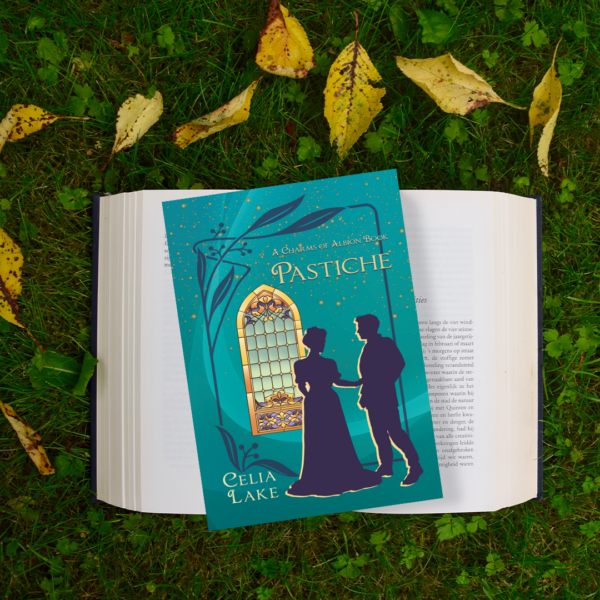Welcome to the first in a series posts focusing on a specific character. We’re starting with Richard Edgarton, who’s appeared in a number of books over his life. He’s married to Alysoun Edgarton, and the father of Gabriel (Gabe) Edgarton and Charlotte Edgarton Wright, as well as grandfather to their children. He’s also been Lord of the land, a Captain in the Guard, and a magistrate for most of his life.
You can find the complete list of books Richard’s appeared in on his page on my authorial wiki, as well as the arc of books that deal with the Edgartons as a family.

In the beginning
In internal chronology, Richard first gets a mention in the final chapter of Four Walls and a Heart. There, it’s 1890, and Magni Torham has come home after a long day. He’s the Duelling Master for Albion’s Guard, responsible for training all the apprentices in necessary skills. His partner, Gil Oxley, wants ot know how it went, and it becomes clear that Magni’s planning to take Richard as his particular apprentice in the Guard.
I wrote this novella last in terms of the writing chronology (of the books that deal with Richard) which meant I could seed this in:
Magni let out a long breath. “I look at what we have. He has expectations about what marriage looks like, I’m sure. The need for an heir. But I looked at him, and I saw – what we were like, at that age. Wanting to live up to things. Be the right shape for them. And I want him to have a smoother road of figuring it out, whatever that looks like for him. The hell of it is, I think maybe I can. Maybe he can. You know how it is, when you duel someone, and you match them. Not skill, that’s different, but the way you go about the thing?”
“Well enough.” Gil’s fingers pulled away, just so he could trace fingers up Magni’s furry arm. “You want someone to be happy like we’re happy, whatever that is for him. I think, Mag, that may be the most romantic thing you’ve ever said.” Four Walls and A Heart – epilogue
Four Walls and A Heart : Epilogue
Of course, it’s not that simple. When we see Richard in 1906, he’s in a cordial marriage with Alysoun, with two young children. But he and his wife are amiable, not in love. Over the course of Pastiche, they figure out how to solve that puzzle – and several more along the way.
Richard as a young adult
What comes out here is Richard’s underlying strength. I think of him as the perfect exemplar of an English oak. Strong, harder, resilient, and absolutely committed to what he’s doing. In Pastiche, he’s already taken on even more responsibility as a Captain of the Guard, as Lord of the land. During the book, he takes on a third, as a magistrate. The questions he asks himself are always about how to do the right thing, but not just the right thing, the honourable and decent thing.
Mentor
From there, Richard comes into his own. By the end of the book, he’s on an arc to handle more delicate investigations. We see him juggling multiple considerations in the background of Wards of the Roses. He wants the problem solved, he trusts Giles Lefton to be able to approach it sensibly.
But he also hopes that there’s a way for Kate Davies to find a place for herself. She does, successfully. The way Giles, Richard, and Alysoun all act as mentors to Kate in their varied ways is also a key aspect of the book. Knowledge shared is a great gift.
Father
As we come into the 1920s, Richard’s career is steady, but now he’s the father of two adult children. In Gabe’s romance (The Fossil Door) and Charlotte’s (Perfect Accord), he’s still working on finding some of that balance.
How much worrying is appropriate, when you have children who will go investigate things that need investigating? Here, Richard is deeply, visibly proud of his children, and not afraid to tell them so. He’s also sure enough of himself – and of them – that he trusts them when they tell him what they need.
Richard’s further mentoring
He’s also acting as a mentor to someone else. Geoffrey Carillon returns from lengthy travel abroad in February of 1922. In Ancient Trust (get a copy by signing up for my newsletter, being on our Discord, or being a patron on Patreon), Richard is one of the people who helps Carillon find his feet in Albion between the wars. Carillon speaks about it, both in Ancient Trust and during the Land Mysteries books, that Richard is the person he’s looked to for a model of both how to be a Lord and how to parent.
World War 2
As we move into the Second World War, Richard’s focus is absolutely on the needs of the war, including how to keep people as safe as possible during the Blitz. He’s worried for Gabe – and Rathna, Richard’s daughter-in-law – in particular, because they have taken on the family desire to solve problems and improve the world.
In the two books particularly focused on this, Old As The Hills and Upon A Summer’s Day, one of the things I love is seeing Richard’s responses to Gabe. They think very differently. Richard is neurotypical in so many ways – and Gabe is absolutely not. Richard is often baffled by his clever, quick, impulsive son. But he also sees himself there, especially how Richard is when he’s duelling, trusting the moment when everything comes together.
This is one of my favourite examples of that: Richard has just asked how Gabe got from the topic they’re supposed to be discussing to making colours with Gabe’s daughter Avigail for the family Holi celebration in the spring.
That got Gabe throwing his head back, a long and loud laugh. “Hemington’s Fifth, one of the scribal errors from Erasmus Minor, the implications for fixatives, that thing Sorcha taught us about blaeberries, the way shed snake skin reacts in potions work, and stumbling into a patch of blackberries?”
Upon A Summer’s Day
He laid out the chain almost casually. Long experience of his son had taught Richard how to follow it once it was laid out. But he would not have made half those jumps, even allowing for the fact Gabe had a vast store of obscure magical lore in his head that Richard did not.
What I love about Richard here is his simultaneous bafflement and acceptance of how Gabe works. He’s able to hold both those things in his head, and delight in them.
Showing Richard Love
And on Gabe’s side, there’s a little thing I don’t know if readers have noticed consciously. Gabe is not nearly as formal as his father unless it’s required. But he understands that there’s something in Richard that appreciates that structure. Gabe will cheerfully refer to his father as ‘sir’ in certain conversations. It’s a loving, affectionate, perhaps slightly teasing recognition that he knows his father likes that tiny reminder of the order of his personal universe.
(We’ll have more about Gabe in due course, naturally.)
I do expect we’ll see a little bit more of Richard in some upcoming books (and there are some small tidbits about Richard in his last years of Schola to come as part of the Mysterious Fields trilogy).
Do you have some favourite bit of Richard? Drop me a note, and I’ll collect them and add them to the post.
